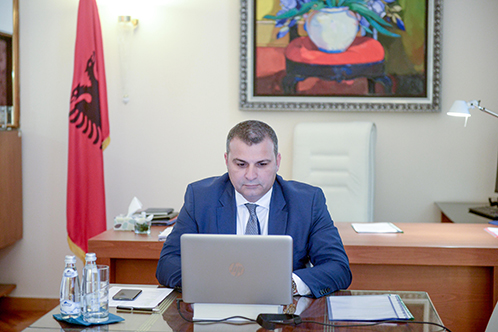BANK OF ALBANIA
PRESS RELEASE
Governor Sejko: Speech at the 43rd Meeting of the Central Banks Governors’ Club of the Central Asia, Black Sea Region and Balkan countries
Publication date: 02.06.2020
My fellow Governors,
We are living in times deeply marked by the Covid-19 pandemic.
Apart from being one of the most severe health crises, it has also turned into the most serious economic challenge in recent history. The spread of the pandemic, coupled with the preventive measures taken against further contagion, have severely disrupted the move of people, goods and services. The simultaneous fall in demand and supply has caused a rapid drop in output, a spike in unemployment, severe difficulties amongst businesses and households, and has laid out complex policy challenges.
Albania is no exception to this picture. We are facing an economic downturn, the sharpest one in the past couple of decades.

The thorough package of the simulating economic policies undertaken to mitigate the negative impacts of pandemic has been both comprehensive and timely. Its objective has been threefold: (i) to allocate appropriate funding to deal with the medical emergency: (ii) to shield vulnerable households and business from the crisis, so as to avoid undue loss of production capacity; and, (iii) to preserve monetary and financial stability,
Given the speed and depth of the emergency, fiscal policy has the primary role in tackling the situation, by partly compensating the loss of income for households and offering liquidity support for affected businesses. The size of the fiscal stimulus package in Albania amounts to about 3% of GDP, in the form of fiscal transfers to households, delayed tax payment, and sovereign guarantees to facilitate bank credit. In our view, the rise of public debt is an acceptable cost in order to ease the social impact of the crisis, avoid widespread bankruptcies and attend the deep negative impact that these bankruptcies would have on the financial stability of the country.
The Bank of Albania intervened swiftly. Our actions were aimed at achieving three goals: (i) ensure the smooth delivery of financial services during the lockdown; (ii) reduce debt-servicing costs of the economic operators; and (iii) safeguard monetary and financial stability as an indispensable precondition to a speedy recovery of economy.
To that extent:
- The Bank of Albania has delivered monetary stimulus in the form of a policy rate cut, now at a new historical low of 0.5%, as well as in the form of increased liquidity injections in the market.
- Furthermore, we instructed banks to offer liquidity relief to viable businesses facing temporary difficulties, in the form of a short-term moratorium on credit instalments as well as in the form targeted credit restructuring. We facilitated this process with targeted and temporary amendments in the regulatory framework that defines these actions.
- We temporary forfeited any charges on using our electronic payment platforms as well as issued detailed instructions to banks in order to facilitate the continuity of their operations.
Looking ahead, uncertainties about the economic damage from the pandemic are unusually high. While any quantitative projection on economic growth still remains subject of assessment, our baseline – and also best case – scenario assumes a V-shaped recovery starting from Q3–2020.
So far, the Albanian banking system remains solid, solvent and liquid. Furthermore, our domestic financial markets appear to be reasonably calm and financing conditions remain supportive to credit growth.
Also, the Bank of Albania has also announced its plans to activate unconventional monetary policy tools, in case the crisis deepens and their deployment would be warranted and inevitable. Such tools will always be in line with our legal framework, and depending on the domestic economic and financial market realities. In addition, any monetary or financial stimulus delivered by the Bank of Albania will be done without harming our financial stability and the health of our domestic banking sector.
We believe in a fair sharing of costs amongst the private, the public and the financial sector. However, any attempt to place a disproportionate amount of costs on the balance sheets of the banking sector will be ultimately counterproductive and to the detriment of the recovery in a second phase.
Finally, let me say that a full recovery from the pandemic will necessarily require a degree of international cooperation. The SEE region includes small open economies that rely on international trade and finance to develop and converge to European Union standards. Any reversal to regional and European integration will be damaging to us.
These are our next challenges, as we move ahead. It is obviously not a paved road, but I am pretty sure that we will succeed.
Thank you for your attention!

 Twitter
Twitter
 Youtube
Youtube
 Facebook
Facebook
 Flickr
Flickr
 RSS
RSS
 Subscribe
Subscribe
 Feedback
Feedback